Investing in rental properties is a proven path to building wealth and securing financial independence. While it’s never too late to start, beginners can face barriers due to its complex process. From market research to property management, the sheer volume of information can feel overwhelming.
At Defy Mortgage, we simplify the mortgage process for investors and homebuyers alike. With 75+ nontraditional options, each fully customizable to fit your unique needs, we can provide solutions for even the most complex loan situations. Whether you’re an entrepreneur, freelancer, self-employed individual, or real estate investor, our fast, reliable pre-approvals, seamless platform, and dedicated support ensure that your experience from application to closing is completely stress-free.
In this guide, we’ll give you the essential property investment tips for beginners, focusing on how to maximize rental income and help you hit the ground running. We’ll first establish the basics of rental income, followed by a breakdown of the various tips you can follow to reap optimal benefits from your investment.
Understand the Basics of Rental Income
Before we discuss property investment tips for beginners, let’s first define rental income. Rental income is the payment received from tenants, serving as a steady cash flow that can cover your mortgage payments, maintenance, and other expenses. Ultimately, it’s meant to generate passive income for the investor.
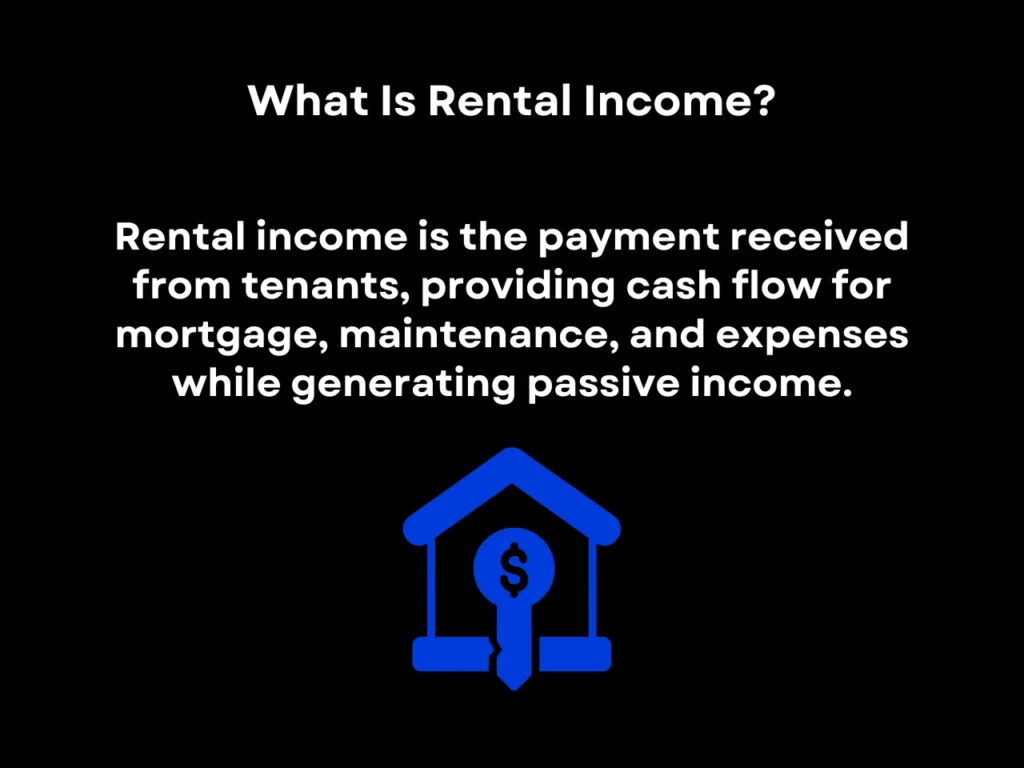
Where Does Rental Income Come From?
Rental income can come from various arrangements. Below are the common sources that could generate rental revenue:
- Single-family homes: Homes for a single family to occupy. They tend to provide the lowest turnover, meaning that tenants are more likely to stay for the long term.
- Multi-family units: These are residential properties designed to house multiple families in separate units within the same building, such as duplexes, triplexes, or apartment complexes. Each unit in a multi-family home provides a separate income stream, making it a popular option for investors seeking more cash flow.
- Short-term rentals: Properties rented out for shorter periods, often through platforms like Airbnb and Vrbo. STRs or vacation rentals can yield higher rental income compared to year-long leases, but they can also come with higher maintenance, more management, and more seasonal fluctuations.
- Condominiums: Condos are individually owned units within a larger community. The common areas provide shared amenities, such as pools and fitness centers, and are managed by a homeowners association (HOA). Investors should factor in the extra cost and regulations when using it as a short-term or long-term rental.
- Commercial properties: These include office buildings and retail spaces, typically involving multi-year leases and higher income. Commercial properties are most profitable in regions with thriving commercial sectors, such as San Diego, but investing in them successfully requires a deep understanding of the commercial real estate market and significant upfront capital.
- Mixed-use properties: These are buildings that combine commercial and residential spaces, such as apartments above retail stores. They are more common in regions with mixed zoning and can offer diversified income streams for investors.
What Counts as Rental Income?
When you report your investment income to the IRS, all rental income must be included in your gross income. Let’s break down what exactly counts as rental income:
- Regular rent payments: These are the periodic payments made by tenants in exchange for occupying your property.
- Advance rent: Payments received before the period they are intended to cover are considered advance rent and must be reported in the fiscal year they were received, regardless of the period they are intended to cover.
- Security Deposits: If you plan to return the entirety of a security deposit to your tenant at the end of the lease, it is not to be included in your income. However, if you have to take any portion of your tenant’s security deposit because they did not live up to the terms of the rental agreement, you must include it in your income report in the year that you did so.
- Expenses paid by tenant: If a tenant pays for expenses that are the landlord’s responsibility, such as utilities or repairs, those payments count as rental income and must be reported. However, the landlord can deduct these expenses if they qualify as deductible rental expenses.
- Property or services in lieu of rent: If you accept personal property or services from a tenant in exchange for rent, you must report the fair market value of the property or services you received in your rental income, unless you agreed upon a price for said property or services. In the latter case, the price at which the property or services were sold to you is reported.
Properties with significant rental income potential are highly suited for debt service coverage ratio (DSCR) loans. These loans adjust their terms based on your property’s ability to generate cash flow instead of your personal finances. This makes DSCR’s rates, loan amounts, loan-to-value (LTV), and other terms more competitive for certain investors.
Tips To Consider For Maximizing Rental Income
Maximizing rental income is a great way to enhance the profitability of your property investments. Here are some tips for how to optimize it, whether you’re investing in single-family homes, multi-family units, or condominiums:
Choose the Right Location for Your Rental
The location of your investment property significantly impacts its rental income. A region’s economic growth, property taxes, schools, utilities, and crime rates can all make or break the income potential of rental properties. Here’s how you can find the best locations to invest in:
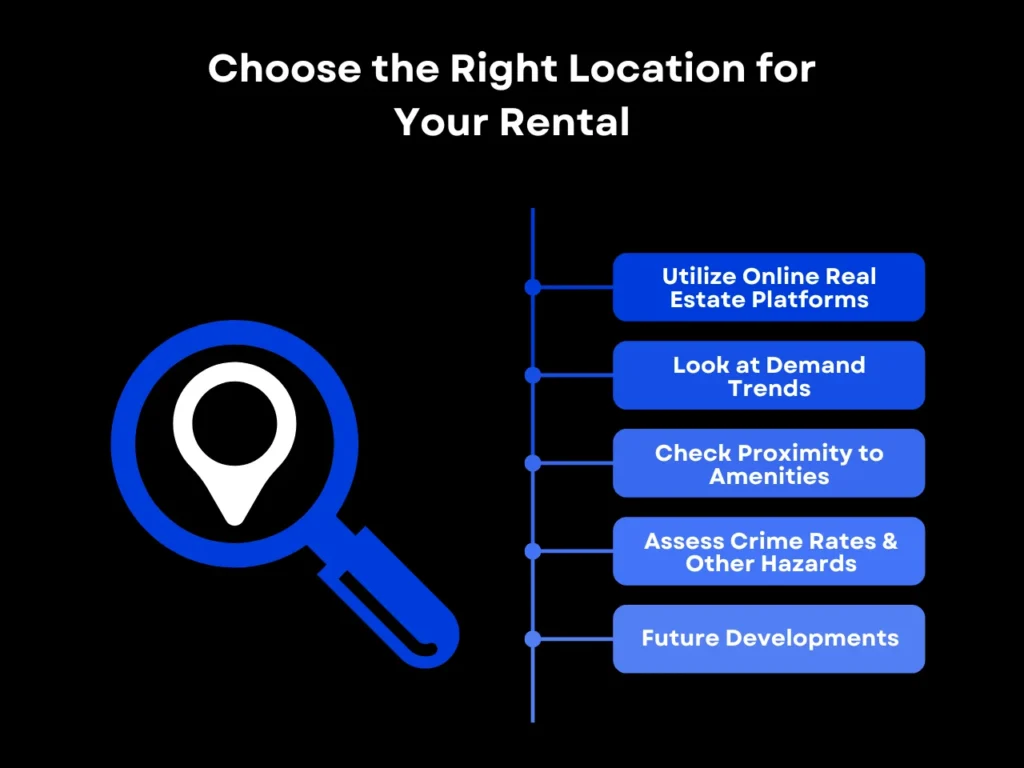
- Utilize online real estate platforms: Websites like Zillow and Redfin offer comprehensive data on property values, rental rates, and market trends. Researching all the available information is essential for identifying areas with strong rental demand and appreciation prospects.
- Look at demand trends: Population growth, domestic migration, and the higher cost of home ownership than renting all drive up rental demand. You can look this up by checking reports in your target areas on the U.S. Census Bureau’s website. The census also contains the American Housing Survey, which can provide crucial information on occupancy rates, rental affordability, and the cost of homeownership versus renting.
- Check proximity to amenities: Easy access to public transport, work opportunities, schools, parks, shopping centers, and other amenities all make a location more attractive to live in. You can use tools like Walk Score or Google Maps to check how close a property is to these amenities.
- Assess crime rates and other hazards: Use local police department websites, public crime mapping tools, and community watch reports to assess whether crime is on the rise in the neighborhood you want to purchase in. Take environmental hazards into consideration as well by using the Federal Emergency Management Agency’s (FEMA) National Risk Index to understand community risk factors. These factors can negatively impact the occupancy and projected appreciation of your property.
- Future developments: In addition to what’s currently available, you should also check to see if developments are being planned in the neighborhood. These developments can create new opportunities in an area, setting it up for faster appreciation and rental demand growth.
Enhance Property Condition and Appeal
A well-maintained property attracts quality tenants and justifies the higher rent. You can boost your property’s appeal by upgrading certain areas strategically. Here are some of the areas that are worth considering:
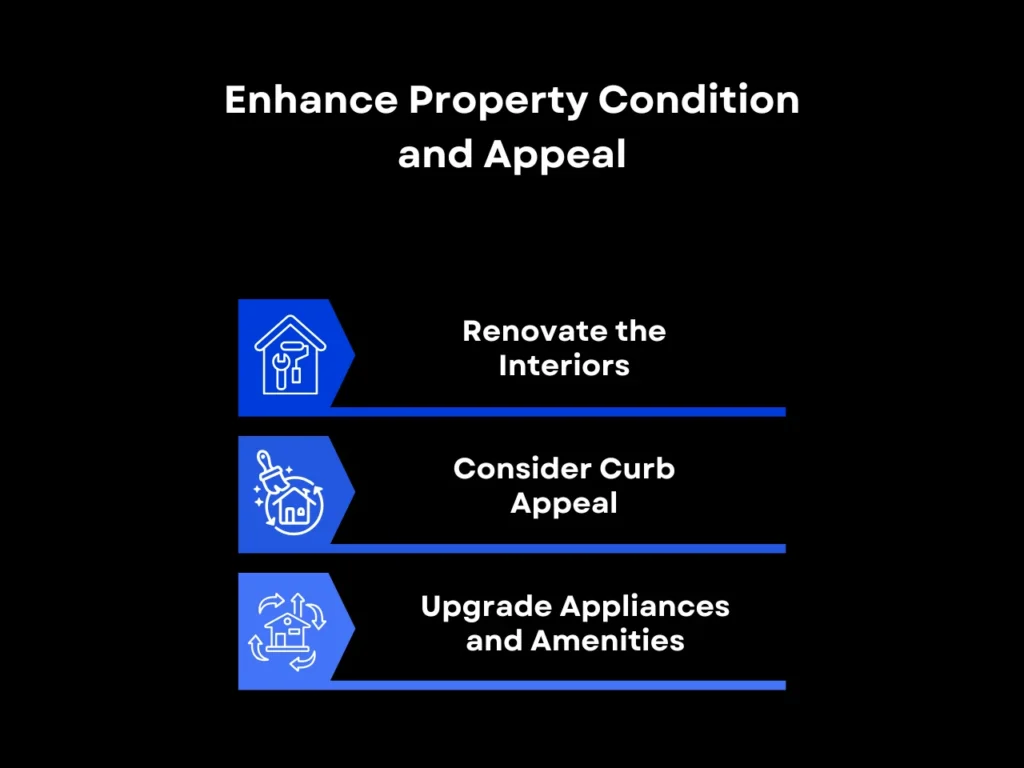
- Renovate the interiors: Strategic renovations, such as modernizing kitchens and bathrooms or installing durable flooring, can make your rental more desirable. Prioritizing simple renovations like fresh paint, updated fixtures, and lighting improvements can often yield an immediate return.
- Consider curb appeal: Curb appeal refers to how your property looks from the outside. Upgrades as simple as a fresh coat of paint and updating the front door, shutters, and mailbox can greatly enhance your property’s first impression. If you have funds to spare, you can improve the aesthetic appeal by investing in better landscaping and exterior lighting.
- Upgrade appliances and amenities: Modern amenities such as energy-efficient appliances can significantly boost your property’s appeal as well. For instance, Freddie Mac found that 70% of renters are concerned about higher utility bills, with 47% willing to pay more rent for an environmentally friendly rental.
It’s important to note that giving your property too many upscale features can also lead to over-improvement. If you price too many upgrades into your rent, it may negatively impact your occupancy rate if the local demographic does not value those upgrades. Remember to always keep your improvements within your average tenant’s price range.
How to Price Your Rental Correctly
Pricing your rental competitively ensures profitability while attracting reliable tenants. Understanding local market dynamics is essential in this process. Here are some key factors to consider as you price your property:
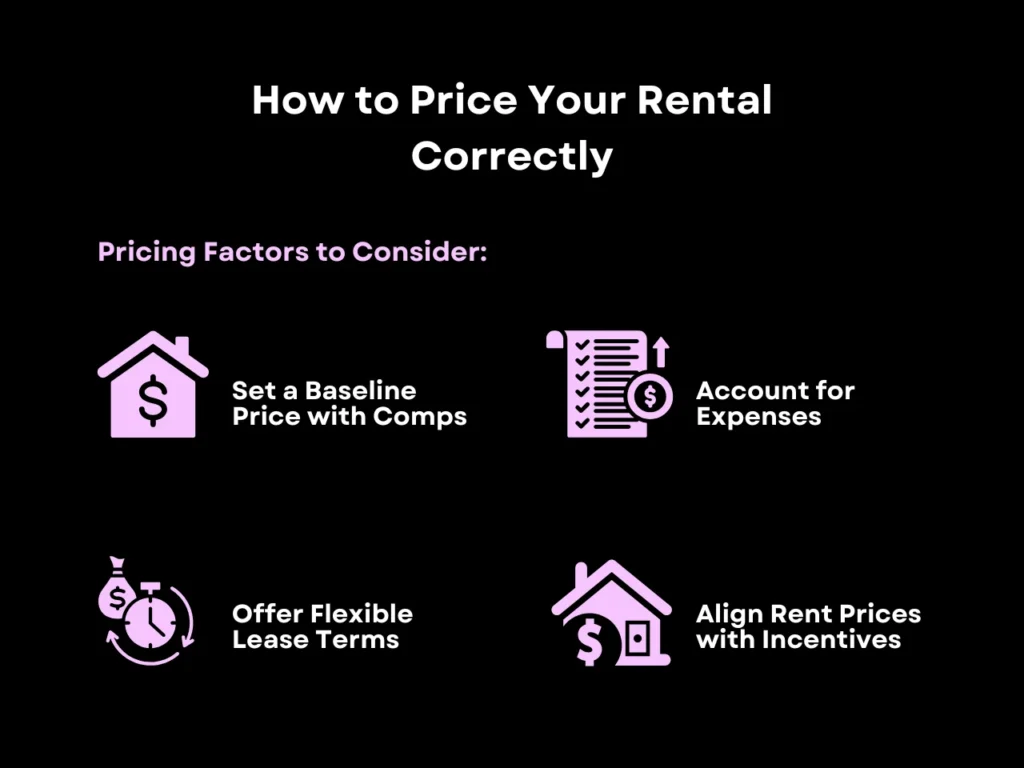
- Set a baseline price with comparable properties: Also referred to as “comps”, comparable properties are simply properties in the same area that have comparable features as yours and are subject to similar conditions. Look at properties with similar size, layout, and locational qualities, and use this to arrive at a baseline for where to set your price.
- Account for expenses: Ensure the rent covers all property-related expenses, such as mortgage payments, maintenance, repairs, and vacancy costs. Then, calculate your desired profit margins on top of it.
- Offer flexible lease terms: Providing options like month-to-month leases or short-term agreements can attract a wider range of tenants, from relocating professionals to those in transitional life stages. This flexibility can also reduce vacancy rates, as tenants who might otherwise hesitate to commit long-term may be more inclined to rent.
It can also help to ask around among renters to identify gaps in the lease offerings in your area that you can fill. - Align rent prices with property features: Adjust your rent based on the desirability of specific unit features, such as updated appliances, hardwood floors, square footage, layout, floor level, and additional amenities like extra closets, balconies, or scenic views.
Screen Tenants Thoroughly
Your tenants can make a huge difference to your experience as the landlord. The right tenants can bring in consistent long-term income, while the wrong tenants can frequently miss rent payments, incur late fees, or cause costly damages to your property. You can minimize your risks by setting up a thorough tenant screening process:
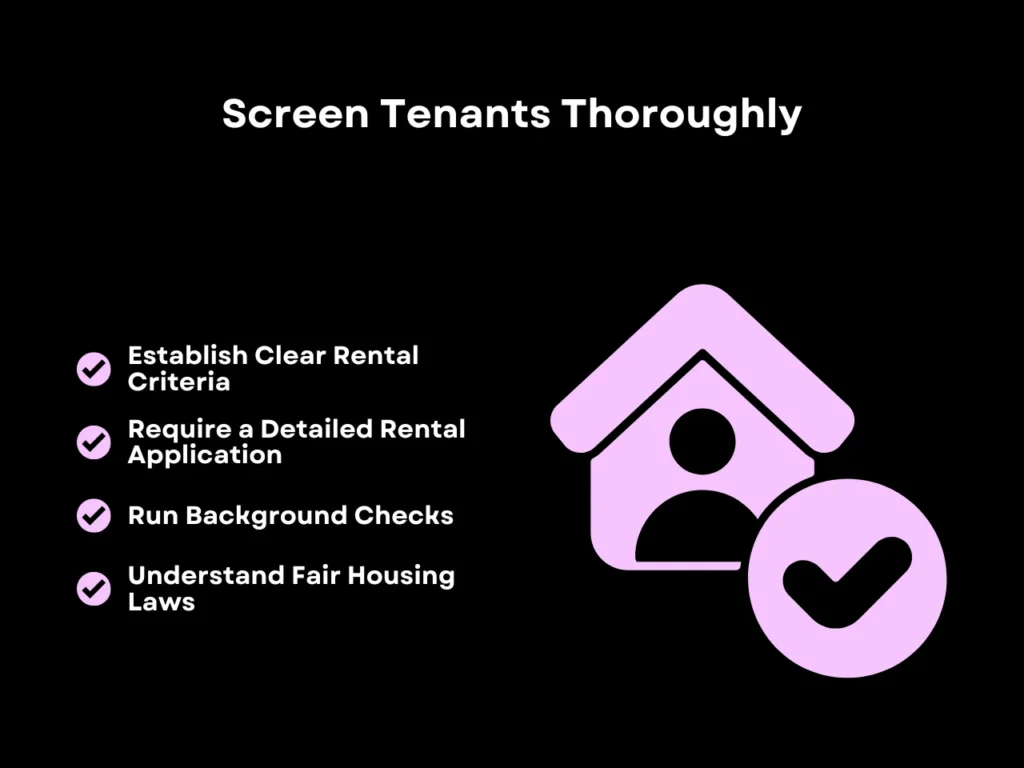
- Establish clear rental criteria: Define the minimum income, credit score, and rental history requirements to ensure your applicants meet financial and behavioral standards. This is the first step to filtering out potentially non-ideal tenants.
- Require a detailed rental application: Collect tenant information such as employment details, rental history, and references to gain a full picture of the applicant’s background. Request pay stubs to verify employment, and consider contacting past landlords to validate the history that the applicant provided.
- Run background checks: While making sure that your screening process is non-discriminatory, you can review the applicant’s credit history and criminal record to see if they are a good fit. You should also check their eviction history to understand if and why they were evicted in the past.
- Consider hiring professionals: Some property management services also handle tenant screening, which can be a great help, especially for beginners. You should keep thorough documentation of rental applications, communications with applicants, and the results of their screening to ensure compliance with fair housing laws and support your case in future disputes.
Utilize Tax Benefits and Financial Planning
There are tax benefits to being a landlord. Understanding tax deductions and financial strategies relevant to you can help you capitalize on available opportunities, such as the following:
- Deductible expenses: Rental property owners can deduct various expenses, including mortgage interest, property taxes, insurance premiums, maintenance costs, and operating expenses, to reduce their taxable income.
- Depreciation benefits: The IRS allows property owners to depreciate residential rental properties over 27.5 or 30 years. This can lead to annual deductions depending on the property’s adjusted basis (excluding the value of the land) and the depreciation method used, which is typically the Modified Accelerated Cost Recovery System (MACRS). Deductions can reduce your taxable income.
- Capital improvements vs. repairs: Repairs on rental properties are generally tax-deductible in the year they are completed, as they are deemed necessary to keep the property in good operating condition. If you’d like to install a new roof, for example, it will be treated as a capital improvement because it increases the property’s value. Capital improvements will depreciate over time.
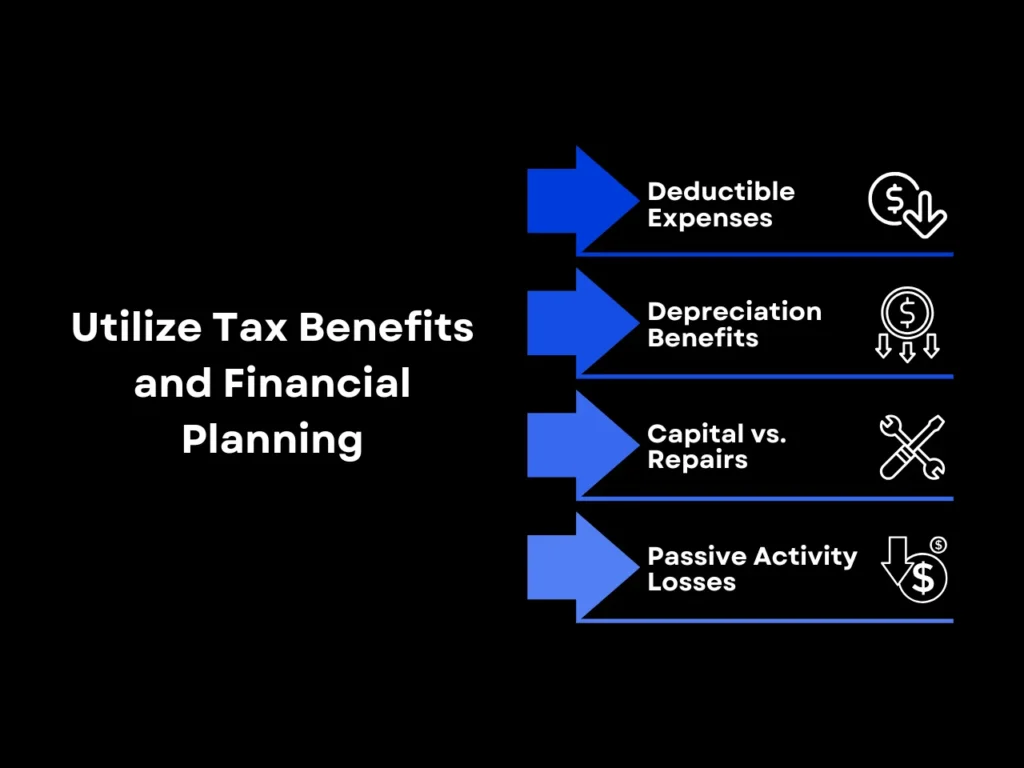
While we don’t offer tax advice at Defy, consider consulting a CPA to fully understand your income management options and maximize your tax benefits. This is a necessary step towards how to make a rental property profitable. A tax professional can spot available deductions you may have missed, help you formulate strategies to optimize deductibility, and ensure compliance with tax laws.
Hire Property Management Services
To streamline operations and potentially enhance profitability, you can consider hiring professional property management companies to handle various tasks, including tenant relations, marketing, maintenance coordination, rent collection, and ensuring compliance with local landlord-tenant laws. Managing a rental property requires time and expertise and partnering with property managers can help you with the following:
- Expert Maintenance and Repairs: Property management companies can conduct regular inspections to identify and address potential issues early, preventing costly repairs down the line. This helps preserve and potentially increase its value over time.
- Effective Tenant Screening: Some property managers can also handle background checks, employment verifications, and rental history assessments, reducing the risk of problematic tenants.
- Reliable Rent Collection: Property management companies typically have experience enforcing rent collection policies and handling late payments. This can help minimize your direct exposure to such communication if needed.
- Legal Compliance and Risk Management: Property management companies are responsible for staying updated on local, state, and federal regulations, ensuring your property complies with all legal requirements. This proactive approach helps avoid potential lawsuits and penalties, safeguarding your investment.
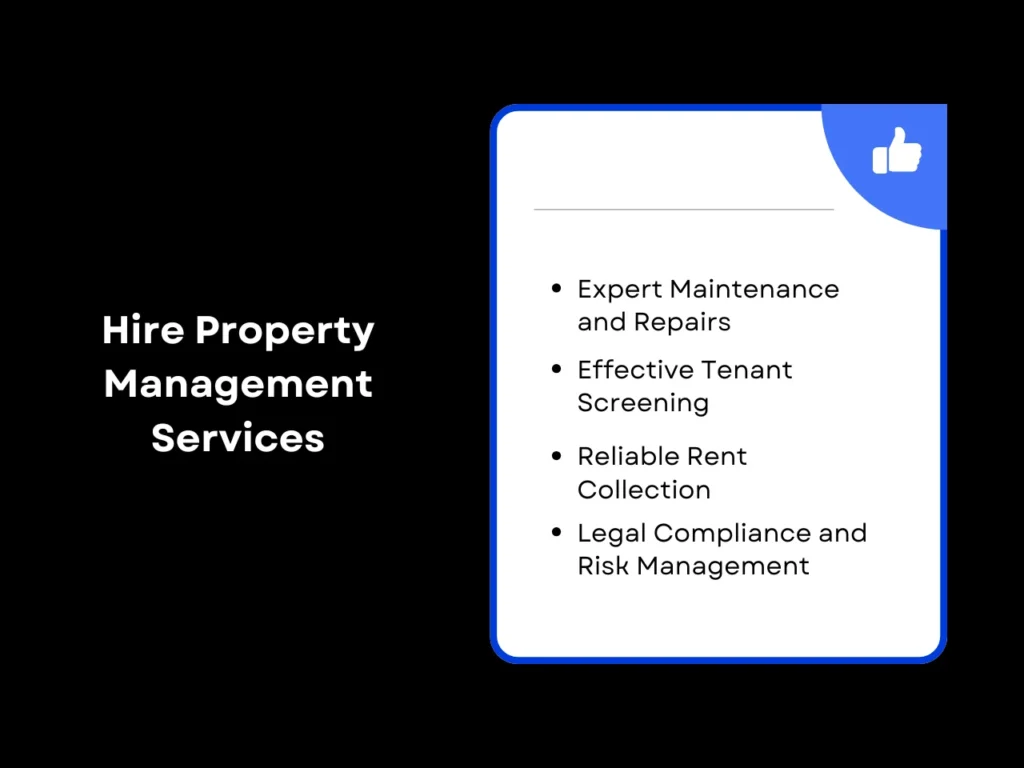
While hiring expert services does mean that it would incur an additional expense, finding a trustworthy property manager can directly reduce your time and effort spent on the property. As a beginner, you would have more time to ease into how to manage the demands of property investment.
Property Investment Tips For Beginners FAQ
How much should I charge for rent as a first-time property owner?
You should determine the right amount by analyzing local market rates for similar properties, considering factors like location, size, and amenities. Your price should allow you to be profitable while maintaining competitiveness with nearby properties.
What type of investment property is best for beginners?
The best investment property for beginners will vary based on the set goals; however, historically, properties near the investor’s primary residence are beneficial for property management purposes. Single-family homes are another option, but individual risk appetites and circumstances apply.
What are the key factors to look for in a rental property?
Focus on location, property condition, potential for appreciation, and proximity to amenities. These factors greatly influence tenant demand and rental income. Carefully weigh these against risks such as crime and environmental hazards.
How do I know if a property will generate good rental income?
You can conduct a rental yield analysis by dividing annual rental income by the property’s purchase price and then multiplying by 100 to get a percentage. A higher percentage yield indicates better income potential.
How much should I put down on my first investment property?
Investment properties usually require at least 15-20% down payment. If your credit score is 680 or higher, you may be able to put down a minimum of 15%, depending on your lender of choice. A 20% down payment can be avoided by considering alternative financing options such as DSCR loans. Be sure to speak to your lender about their LTV options and qualification requirements to qualify for less money down.
What are some common mistakes beginners make with rental income?
Common pitfalls include underestimating expenses, neglecting tenant screening, overpricing rent, and failing to maintain the property. Avoiding these can enhance profitability.
How often can I raise the rent on my rental property?
Rent increases depend on local laws and lease agreements. In Oakland, California, for example, you can only increase rent once per year. Be sure to check your local regulations and include the details in your lease agreements.
Key Takeaway
By following these property investment tips for beginners, you can build a stable rental income stream and achieve long-term financial success. Maximizing rental income begins with selecting the right property in the right location, improving its appeal, and setting competitive rent. Thorough tenant vetting, leveraging tax benefits, and outsourcing property management can further enhance profitability.
Ready to explore your investment property financing options? Start a conversation with Defy today and let our mortgage experts get to know you and your unique investment goals.







